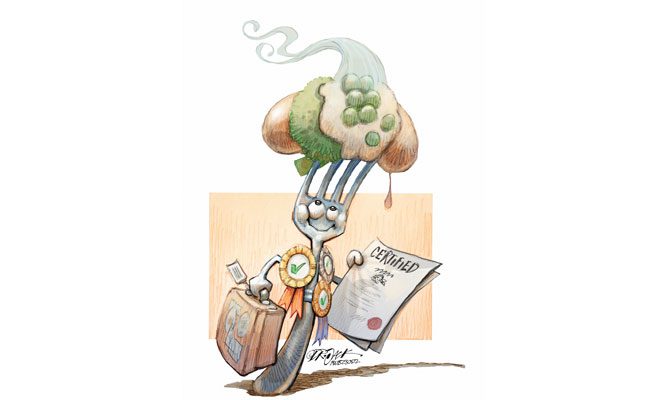
Traceability has become a crucial element of food safety and quality assurance in agriculture. International governments and consumers are increasingly concerned about the safety and validity of claims about the produce they import and consume.
The food supply chain is complex, and a lack of transparency and technology solutions in the supply chain system creates significant challenges for agribusinesses today.
Implementing end-to-end traceability in agriculture contributes more than just regulatory compliance or ensuring food safety. It lowers operational costs for producers, improves profitability, regulates fraudulent activities or unethical practices, and unlocks new business opportunities. It’s worth highlighting how traceability technology can help to highlight unnecessary bureaucracy that disproportionally increases the production cost to the farmer, and therefore to the consumer.
In essence, we need to have a blockchain-type process that enables every loaf of bread or avocado consumed to be rated on its nutrition density, value, origin, and cost to the environment, and not just in rands and cents.
Global trends and drivers for traceability
- Changing consumer demands and preferences
Consumers worldwide expect food and fibre products to align with their preferences, including higher animal welfare, sustainability, and other production and supply chain characteristics. Meeting these demands requires end-to-end traceability that tracks the entire product life cycle from farm to fork. - Increasing import market regulations
Mandatory measures being implemented by importing country governments are increasing, and agribusinesses must respond to these measures in a timely and efficient manner to maintain market access and take advantage of the opportunities available in growing export markets. - Increasing globalisation and competition in the agribusiness industry
South Africa is a major producer and exporter of a wide range of agricultural products, including fruits, vegetables, grains and livestock. The country’s agribusiness industry is facing increasing competition from other producers around the world, who are also seeking to capture a share of the global market. To remain competitive, South African agribusinesses need to demonstrate that their products are safe, of high-quality, and sustainably produced, and that they can be traced back to their origin.
Traceability can help South African agribusinesses meet these demands by providing a means of verifying the safety, quality, and sustainability of their products. It can also help them to differentiate their products from competitors by highlighting their unique characteristics and attributes. Additionally, traceability can help reduce the risk of product recalls or contamination incidents by allowing for prompt and targeted responses to any issue. - Emerging and evolving technology
New technology is driving higher industry and government expectations for transparent, accurate, appropriate and timely information. Integrating these technologies into business management systems for enhanced traceability can help increase productivity, reduce food waste and fraud, and improve food safety and biosecurity assurances.
SA traceability success stories
- Wine
South Africa is one of the world’s top wine-producing countries, and the wine industry has implemented a traceability system called the Integrity and Sustainability Certification programme. It requires participating wine producers to implement environmental and social sustainability practices and maintain records of their production processes. The programme also provides for third-party auditing to ensure compliance with the standards. - Beef
Traceability systems are increasingly being implemented in the South African beef industry to meet the requirements of export markets. One example is the Meat Safety Act (MSA) of 2000, which requires all abattoirs and meat processors to maintain records of the animals they process and the products they produce. The MSA also provides for the identification and tracing of individual animals using ear tags and other identification methods. - Rooibos tea
South Africans love their rooibos, and the country’s signature ‘red bush’ tea has gained popularity in international markets. In 2021, the European Commission approved the registration of the designation ‘Rooibos/Red Bush’ in its Register of Protected Designations of Origin and Protected Geographical Indications. Product names registered as protected designations of origin have strong links of traceability to their source, since every aspect of production, processing and preparation must take place in that specific origin using recognised know-how. - Woolworths
Woolworths South Africa is strongly committed to traceability throughout its supply chain to ensure the safety, quality and sustainability of its products. The company aims to have a transparent, traceable and ethical supply chain by 2025. To this end, it has implemented several initiatives to improve traceability and transparency. These include supplier auditing, detailed product labelling, sustainable sourcing, and technology solutions to improve traceability and transparency, such as blockchain and radio-frequency identification technology, which allows for real-time tracking of products through the supply chain.
Why is traceability key to a sustainable future in SA agriculture?
- Knowing and minimising your carbon footprint
Certain supply chains are putting pressure on farmers to minimise their carbon footprints. With access to traceability and carbon data, farmers become better equipped to make informed decisions for suppliers, transporters and partners to work with. Using products that have already quantified their carbon footprint is an easy way to choose products that can lead to lower footprints and more attractive produce prices. - Ensuring food safety
Traceability systems allow for the identification and tracking of agricultural products from farm to fork. This makes it easier to detect and contain food safety incidents, such as outbreaks of food-borne illness. By implementing traceability systems, South African agriculture can help ensure the safety of its products and protect public health. - Promoting environmental sustainability
Traceability systems can also help promote environmental sustainability by allowing for the monitoring and management of inputs and outputs throughout the supply chain. This can include tracking the use of pesticides, fertilisers and water, as well as the emissions of greenhouse gases and other pollutants. By monitoring and managing these factors, South African agriculture can reduce its environmental footprint and promote more sustainable practices. - Enhancing market access
Many international markets increasingly require traceability for agricultural products. By implementing traceability systems, South African agriculture can meet these requirements and gain access to these markets, which can help increase export earnings and support economic development. - Supporting social sustainability
Traceability systems can also help support social sustainability by promoting fair labour practices and ensuring compliance with social standards. This can include monitoring working conditions, ensuring fair wages and benefits, and protecting workers’ rights.
Traceability is key to a sustainable future in South African agriculture, as it supports food safety, environmental sustainability, market access, and social sustainability. By implementing traceability systems, South African agriculture can ensure the safety, quality and sustainability of its products, and support economic development and social well-being.
Watch this space: new technology is accelerating traceability, and the journey is going to be an exciting one!
The views expressed in our weekly opinion piece do not necessarily reflect those of Farmer’s Weekly.
Justin Platt has been involved in the agricultural services industry since 1979. He is an active participant in industry bodies such as the Fertilizer Association of South Africa and Potatoes South Africa. He is also one of the few Southern African-registered consultants for Brookside Laboratories Incorporated in Ohio, US.












